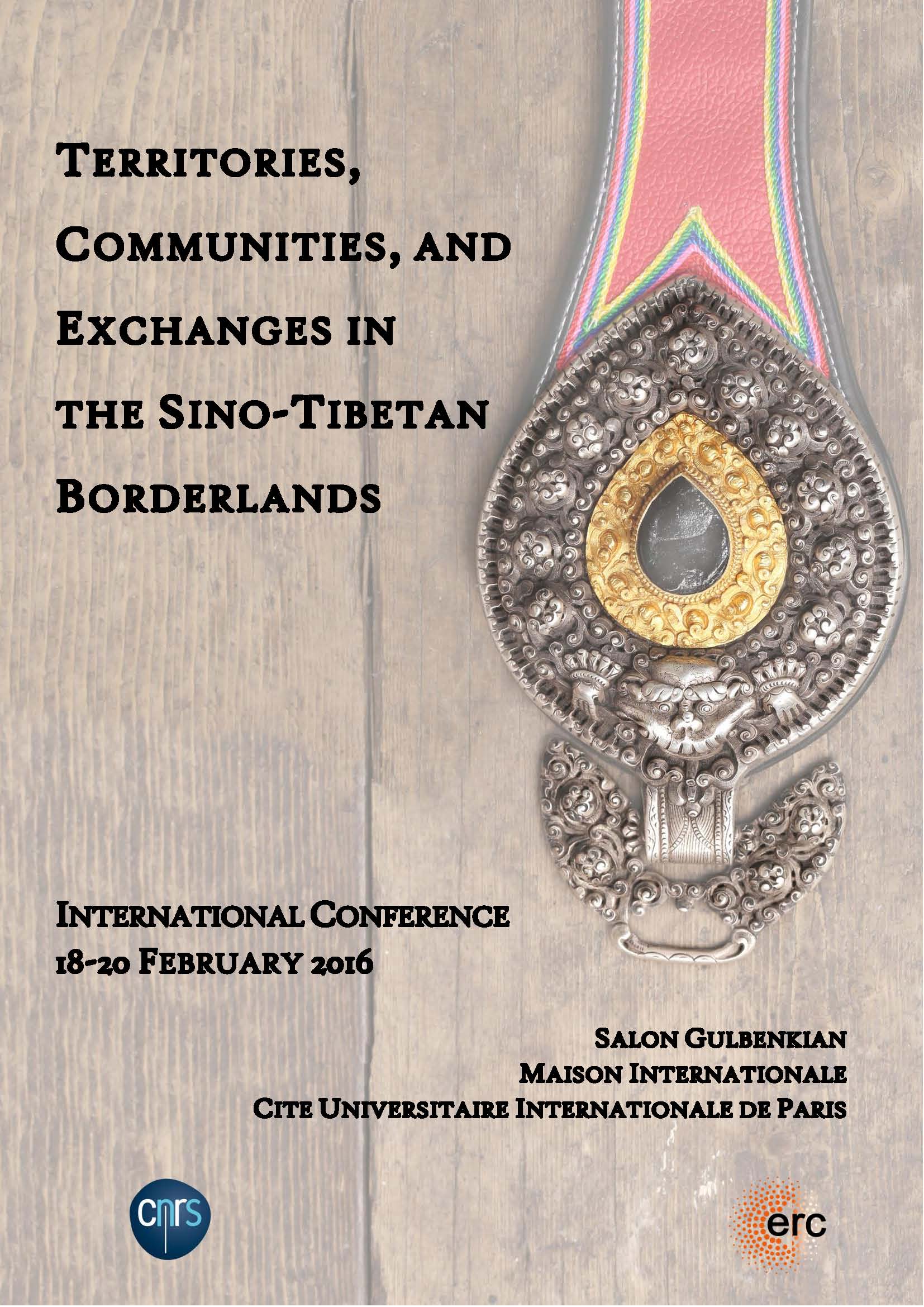Notice
Isabelle Henrion Dourcy (University of Laval), "Making Movies in the Gesar Heartland: The Burgeoning of a Kham Film Production in rDzogs-chen "
- document 1 document 2 document 3
- niveau 1 niveau 2 niveau 3
Descriptif
This conference is an outcome of the collaborative ERC-funded research project “Territories, Communities, and Exchanges in the Sino-Tibetan Kham Borderlands”
This research project focuses on the area of the Sino-Tibetan borderlands situated within the People‘s Republic of China, and referred to as Kham by Tibetans who make up most of the population of this region divided between the provinces of Sichuan to the east, Yunnan to the south and the Tibet Autonomous Region to the west. This research project intends to explore from a comparative perspective the possible definitions of this entity called Kham, which in the course of history has never strictly corresponded to any administrative unit or coherent whole, and which ultimately should be considered as a land of encounters, a place of métissage.
The multidisciplinary team undertakes ethnographic field studies and documentary research including archival research and contribute fresh, first-hand material to the socio-cultural diversity of Kham.In-depth investigation of the internal diversity of Tibet and its connection with the outside remains sketchy and thus a particular focus of this project is to delve into the complexities of Tibetan society in China. The multi-tiered and multi-scalar approach, with an emphasis on networks, will enhance work on historical mapping, which is still practically non-existent in this region.
This project aims to strengthen international academic exchanges and to produce a strong network of collaboration on Kham studies: it is our hope that this conference will contribute significantly to this end.
For more information, please visit the project's Website: http://kham.cnrs.fr
Dans la même collection
-
Lucia Galli (University of Oxford), "The Price of Enlightenment: The Travel Account of Kha stag ʼDz…
Frontier territories characterised by intense socio-economic, political, and cultural inter-actions, in the mid-nineteenth century the easternmost fringes of the Tibetan plateau saw the rise of the
-
John Bray, "French Catholic Missions and Sino-Tibetan Trade: Local Networks and International Enter…
The Missions Étrangères de Paris (MEP) sent their first missionary on an exploratory mission to the Sino-Tibetan borderlands in 1847, and they retained a presence in the region until 1952. Together
-
C. Pat Giersch (Wellesley College), "Patterns of Inclusion and Exclusion Along Twentieth-Century Ch…
In recent years, increasingly sophisticated work has traced the remarkable changes in early twentieth-century state-building along China's southwestern and Tibetan borderlands. During this same period
-
Yudru Tsomu (Sichuan University), " Rise of a Political Strongman in Dergé in the Early Twentieth C…
This paper discuses rivalry for the throne of Dergé between 1890 and 1940. In the late nineteenth and early twentieth centuries, internecine feuds created a power vacuum serious enough to invite
-
Katia Buffetrille (Ecole Pratique des Hautes Etudes), " The Increasing Visibility of the Borderland…
For centuries, Central Tibet and its capital Lhasa were regarded as the center—as is obviously expressed in the very name of the region in Tibetan, dBus, “Center”—of political and religious life in
-
Scott Relyea (Hamline University), " Settling Authority: Sichuanese Farmers in Early Twentieth Cent…
From 1907 to 1911, some 4,000 commoners from the Sichuan Basin ventured west. Enticed by promises of large tracts of uncultivated land and three years of free rent, seeds, animals, and farm implements
-
Chen Bo (Sichuan University), “House Society” Revisited "
In this paper, I will begin by considering the concept of “house society” and its applicability to Southwest China. I ask the question of why no scholar, Levi-Strauss included since he originally
-
Dáša Mortensen (University of North Carolina at Chapel Hill), " Wangchuk Tempa and the Control of G…
This paper examines the fascinating life of Wangchuk Tempa 汪学鼎 (1886-1961), the de facto early-twentieth-century political and military leader of Gyalthang (rGyal Thang) in southern Kham, in order to
-
Mark Frank, " Chinese Physiocracy: Kham as Laboratory for the Agrarian Theory of China "
When a nation-state looks to intensive agriculture for its national essence, what are the implications at the local level? This paper looks at agricultural colonization efforts (tunken屯垦) of the
-
Stéphane Gros (Centre National de la Recherche Scientifique), "Matrifocality and the House in Drapa…
GrosStéphaneThe practice of a non-contractual, nonobligatory, and nonexclusive visiting sexual system among a matrilineal group in Southwest China has generated as much interest in anthropology as in the mass
-
Tenzin Jinba (National University of Singapore), " Two Gyalrong Weddings Under Fire: Rethinking of …
Two weddings in 2009 and 2015 respectively have received wide publicity among Tibetans and others within and out of China. The first was that of Lobsang Dundrup, a renowned singer from Gyalrong, and
-
Eric Mortensen (Guilford College)," Boundaries of the Borderlands : Mapping Gyalthang"
This project seeks to discern the physical and conceptual boundaries of the Tibetan region of Gyalthang, in southern Kham. At issue are questions about the relationships between older













